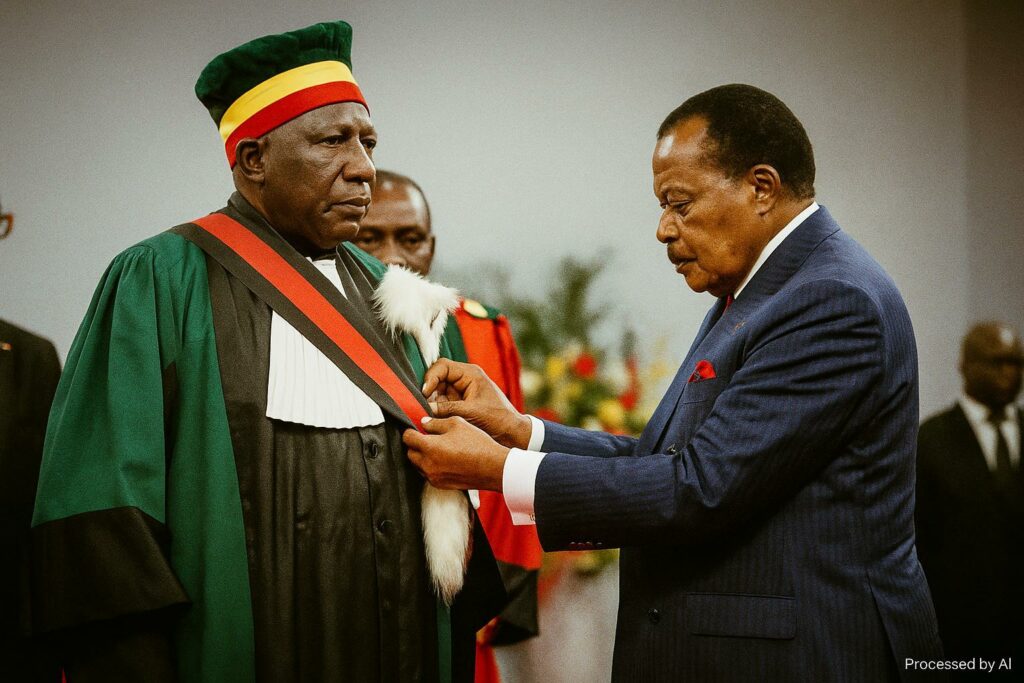State Pageantry Signals Intellectual Diplomacy
The vast rotunda of Brazzaville’s Palais des Congrès, usually reserved for continental summits, assumed a scholarly aura on 25 July as President Denis Sassou Nguesso conferred the Grand-Croix of the National Order of Merit upon Professor Théophile Obenga. Flanked by the diplomatic corps and an array of academic robes, the Head of State described the ceremony as a tribute to “knowledge in the service of the Republic,” an expression that quietly situates Brazzaville within the broader African tendency to weaponise soft power through cultural distinction. Observers noted the meticulous protocol, from the cadence of the presidential guard to the evocation of national unity in the official address, echoing similar honours bestowed on literary icons in Senegal and Côte d’Ivoire over the last decade (Jeune Afrique, July 2025).
An Intellectual Trajectory Rooted in Pan-Africanism
Obenga’s scholarly itinerary is emblematic of post-independence African academia. A disciple of Cheikh Anta Diop, the Congolese thinker pursued Egyptology at the Sorbonne before returning to lecture at Marien Ngouabi University, ultimately steering Congo’s Ministry of Education during the 1990s. His fifty-plus publications, ranging from historical linguistics to philosophy, buttress the thesis of a civilisational continuum linking the Nile Valley with Central Africa. UNESCO archives record his contributions to the General History of Africa project, where he argued that reclaiming ancient epistemologies remains indispensable to continental rebirth. By elevating such a figure, Brazzaville frames itself as a custodian of an intellectual heritage that transcends colonial cartography.
Symbolism Beyond the Sash and Star
In Congolese orders of chivalry, the Grand-Croix is rarely awarded to living scholars; it is more often reserved for visiting heads of state or national heroes. Diplomatic analysts see the gesture as a calibrated signal to domestic elites and foreign partners alike. While the Republic negotiates infrastructure financing with multilateral lenders and pursues EITI compliance, the regime underscores an alternative metric of legitimacy—cultural capital. According to a senior official in the Ministry of Foreign Affairs interviewed off the record, honouring an internationally cited academic augments Brazzaville’s negotiating leverage in UNESCO committees and African Union cultural councils.
Alignment with Higher-Education Reforms
Appointed the President’s Personal Representative for Higher Education Development in 2024, Obenga has championed a competency-based overhaul of Congolese universities, favouring regional research clusters over the traditional faculty model. Minister Delphine Edith Emmanuel, speaking during the ceremony, stressed that the decoration “reinforces a reform agenda anchored in excellence and patriotism.” Since 2022, the government has increased the higher-education budget by eleven percent, channelled toward digitisation and laboratory infrastructure, figures corroborated by the latest IMF Article IV consultation. Analysts argue that celebrating a reform architect domestically bolsters continuity, particularly as Brazzaville courts public-private partnerships with francophone institutions.
Continental Echoes of Recognition
Reaction across African intellectual circles was swift. South African linguist Pitika Ntuli lauded the award as “a reaffirmation that scholarship remains a pillar of sovereignty,” while Nigeria’s University of Ibadan dispatched a congratulatory communiqué highlighting Obenga’s role in reviving comparative Bantu studies. Such endorsements, relayed by regional media platforms, serve to amplify Congo-Brazzaville’s cultural diplomacy. They also dovetail with the African Union’s Agenda 2063, which emphasises knowledge economies as vectors of integration (African Union Secretariat, 2024).
Anticipating the Legacy Curve
In his acceptance remarks, Obenga dedicated the insignia to African youth, exhorting them to “guard the grammar of their ancestors while coding the algorithms of tomorrow.” The phrase encapsulates the intergenerational ambition underlying Brazzaville’s current intellectual strategy. Whether forthcoming university reforms fully materialise remains contingent on fiscal space and regional stability, yet the Grand-Croix places symbolic momentum firmly in the professor’s favour. For Congo-Brazzaville, nurturing that momentum could translate into a durable brand of knowledge diplomacy, one that aligns the republic with a broader continental renaissance while reinforcing the political centre. In the measured elegance of the ceremony, many diplomats sensed a clear message: in Brazzaville, the pursuit of ideas remains inseparable from the pursuit of statecraft.

